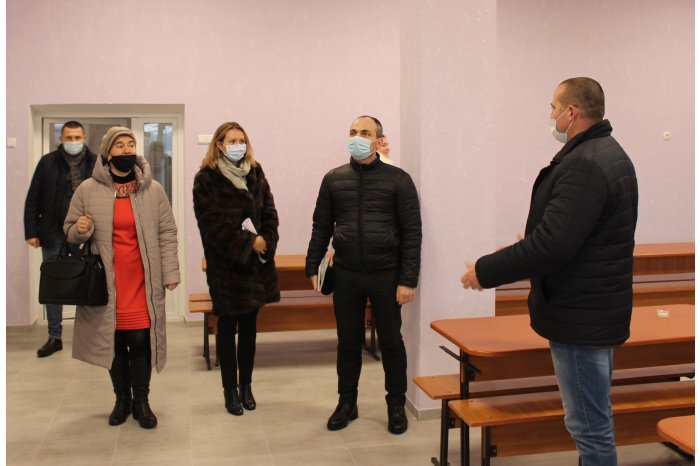
Moldovan deputy premier for reintegration pays fact-collecting visit to eastern district's settlements
Chisinau, 9 December /MOLDPRES/ - Deputy Prime Minister for Reintegration Olga Cebotari on 8 December paid a working visit to the Molovata Noua settlement, eastern Dubasari district, the Reintegration Policies Bureau has reported.
The official’s first visit to settlements from the Security Zone took place in the context of an invitation received on behalf of the Molovata Noua village on finishing the implementation of two projects financed through the programme of activities for Moldova’s reintegration for 2020 (PART 2020).
At the same time, the visit gave possibility to collect facts on the spot about the problems of the residents and consider possible interventions and the necessary assistance on behalf of the central public authorities.
Olga Cebotari, accompanied by representatives of the Reintegration Policies Bureau, had a joint discussion with the head of the Dubasari district, Grigore Filipov, mayor of the Molovata Noua village, Oleg Gazea, head of the Chisinau territorial office of the State Chancellery, Veaceslav Anghel, the headmasters of the Anatol Codru gymnasium and the community centre.
The participants in the discussions examined the degree of implementation of the projects financed through PART for 2020, residents’ current difficulties, as well as the ones triggered by the COVID-19 pandemic, carrying out of the online education process and migration processes.
Another subject regarded the free movement and ways of access from/to five settlements from the Cocieri plateau: Molovata Noua, Roghi, Cocieri, Vasilievca, Corjova and the Dubasari town.
The sides also discussed the issue of access way as a result of the presence of the infrastructure of the control posts set in an unauthorized way by Tiraspol’s representatives and ways of ensuring the free movement of people, goods and transport means.
Special attention was paid to ways of ensuring access to the plateau through the ferryboat, which during winter can be blocked because of the ice on the Dniester river and respectively, it is necessary to identify alternative access ways.
At the same time, Deputy Prime Minister Olga Cebotari also met the manager of the state enterprise Bacul Molovata, Vitalie Gatcan; the sides discussed the need to reopen the routes of an additional ferryboat, in order to enhance the capacity of transportation and modernization of the port and transport infrastructure. Attending the discussions, the head of the Chisinau territorial office of the State Chancellery, Veaceslav Anghel, gave assurances that he would personally get involved in the settlement of problems dealing with the arranging facilities for the ferry’s passengers.
This year, the number of passengers and transport means who crossed the Dniester river by the ferry increased significantly. In the first half of 2020 alone, the number of passengers and transport means who used the ferryboat grew by 12,000 units each and the volume of goods carried increased by 23,000 tons up to almost 70,000 tons.
Also, at initiatives by the Reintegration Policies Bureau, in the first half of this year, the ferryboat made by 90 routes more against the same period of the year before and the schedule of the ferryboat’s movement was extended by several hours.
In the context, it is worth mentioning that, starting from 2011, the mayoralty of the Molovata Noua village has benefited from financing worth 2.4 million lei for implementing projects through PART.
Also, it is worth to be mentioned that, in 2020, 15 million lei was allocated for financing 42 activities in the settlements from the Security Zone.
As many as 435 projects/activities worth about 126.74 million lei have been implemented in the settlements placed in the perimeter of Moldova’s Security Zone.
photo: Reintegration Policies Bureau
President at diplomatic conference for establishment of International Claims Commission for Ukraine: If aggression goes unpunished, risk of new wars increases
Government discusses measures to combat organized crime for ensuring citizen security
President Maia Sandu’s Speech at the Conference on the Adoption of the Convention Establishing the International Claims Commission for Ukraine
Moldovan president meets Ukrainian counterpart in The Hague
Moldovan PM says justice reform about future of Moldova – about citizens' trust, economic development, country's rightful place in European family
Moldovan PM meets Ambassador of Azerbaijan to Moldova
Moldova represented at 10th meeting of Interreg Europe Programme Monitoring Committee
Moldovan president attends diplomatic conference for establishing International Claims Commission for Ukraine
EU accession, economic, energy cooperation– on agenda of Moldovan president's visit to Athens
President Maia Sandu’s speech at joint press conference with Prime Minister of Greece Kyriakos Mitsotakis
President conveys congratulatory message to Jewish community in country celebrating Hanukkah
Moldovan President on working visit to Hellenic Republic
Moldovan PM urges to cherish inherited cultural heritage, protect it for future generations
Moldovan head of state, President of Cyprus discuss European integration
Crossing of Maiaki-Udobnoe bridge suspended again following another drone attack
Nicolae Testemitanu Medical University of Moldova, Swiss Red Cross sign agreement on training of resident students, physicians, pharmacists
Modern transport for pupils of Moldova: 23 minibuses delivered to schools nationwide
Moldova receives 150 million euros from EBRD for strategic road modernization
Traffic on Maiaki-Udobnoe bridge in Ukraine partially resumed
Head of State, EBRD President discussed development projects and attracting investments into Moldovan economy
Ministerial meeting of Energy Community: Moldova reaffirms commitment to building secure and competitive regional energy market
Moldovan Governor at BNM 2025 – European Momentum Conference
Traffic at Moldovan-Ukrainian border partially suspended after drone attacks in Ukraine
Parliament Secretariat officials engaged in experience exchanges with European Parliament and Parliaments of Austria and Albania
Moldova launches tender for construction of large wind power plants with storage batteries
Intraday electricity market launched in Moldova
Strengthening Moldovan-British cooperation on agenda of discussions between Finance Minister and Ambassador Fern Horine
VIDEO // Enhanced waste management infrastructure in Ruseni village, Anenii Noi: individual bins for residents
DOC // NBM issues commemorative coin - Moldova in Single Euro Payments Area
Moldovan PM in Comrat says government invested significantly in Gagauz region's development

